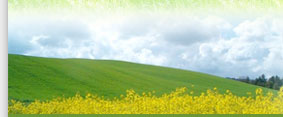
|
Beans are intricately woven into the fabric of human history
.The first permanent cultures evolved when hunter- gatherers and
nomadic people began tilling the earth and developing systems of
agriculture, and beans were among the first cultivated crops.
This progression served as a gateway from what could be
considered a primitive existence into a more stabilized one,
which allowed for long term living situations to be established.
With the knowledge of agriculture came the domestication of
animals and the art of creating tools and implements. These
three things combined, altered the course of human history in an
unparalleled way, and beans played an integral part.
Moreover, beans are still an important part of world agriculture
and are an essential part of a balanced diet in many countries.
Beans come in hundreds of shapes, sizes and colors, are
versatile and amazingly convenient because they can be dried and
stored or years. Soaking beans for a couple of hours brings them
back to life, activating enzymes, proteins, minerals and
vitamins.
On the other hand, beans have been used throughout the world for
thousands of years. Evidence exists that suggests, that native
people of Egypt was cultivating bean crops as far back as 7000
BC.
Along many years and since long eras, the Egyptian had used the
dried herbs in general and the beans in particular as their main
nutrition. , as the bean is considered one of the traditional
meals for the Egyptian since the pharaohs Era and until now
The early farmers who were growing beans also grew grains.
(wheat ,barley, millet, rice and corn) .Beans and grains have a
symbiotic relationship in which the amino acids of each
complement one another in such a way as to form a complete
protein, which is the foundation for the growth and development
of many life formed, including humans. Regional and cultural
combinations such as lentils and rice, lima beans and corn, and
chickpeas (garbonzo beans) and couscous are a reflection of this
correlation.
The use of lentils has been traced back as far as 6750 BC in
parts of the present day Middle East. Chickpeas, Lentils and
Fava Beans have been found in Egyptian tombs that date back at
least 4000 years. About the same time, (around 1500 BC) parts of
present day Asia were growing and using soybeans
Important evidence is The Holy Quraan which shows Egypt's fame
concerning the production of bean since Moses era. Also it shows
how the pharaohs store the grains in particular silos since
josses Era. This led to the Egyptian perfection in manufacturing
and storing herbs and preparing their meals, most of which made
from the dried herbs.
Now, in this field, Egypt is considered as one of the important
markets in the world as a consumer and a commercial partner,
particularly in beans. It is not to say that beans are still
important part of world agriculture and are an essential part of
a balanced diet in many countries.
WADI
ELNIL is one of the great companies in Egypt in
producing split broad beans in Egypt. It has also an experience for
more than seventy years in this field as a producer and a
distributor inside, which enables it to prolong its activity
outside.
|
|
|
|
 |

